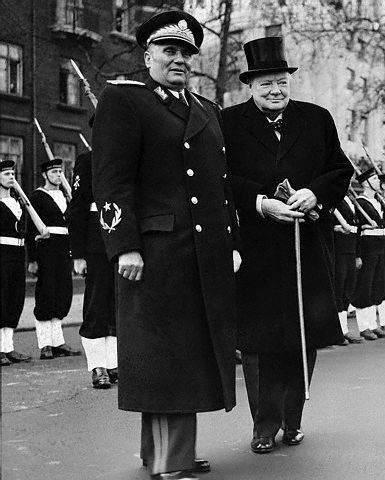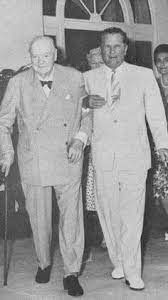Tito was a charismatic personality who built a unique path in the world of politics during and after World War II. As an extremely talented and gifted geopolitician, he led Yugoslavia on a path where it did not belong either to the Eastern Bloc, which was dominated by the Soviet Union, or to the Western Bloc, which was heavily influenced by the United States of America. Tito was one of the founders of the Non-Aligned Movement, a group of countries that did not want to join either bloc.
During the Second World War, Tito fought two battles, on the military and diplomatic fields. It was difficult to explain to the Americans and the British at the beginning of the war who was who in Yugoslavia and to show that the partisans were the only resistance movement that opposed Nazi Germany and fascist Italy on the territory of Yugoslavia. The refugee royal government and King Petar himself spread falsehoods and convinced the allies that the Chetniks led by Draža Mihajlović were a defensive army, so earlier during the war that Roosevelt and especially Churchill stood by them. Given that Britain and America sent military missions to the territory of occupied Yugoslavia, these countries soon received reports from the field about the real situation in Yugoslavia. Although it was clear that Tito's army and Tito himself were the team that needed to be supported, Britain and America still had the idea of post-war Yugoslavia as a monarchy headed by a fugitive king. Russia supported Tito politically during the war, although no military aid came from Russia. Tito and his resistance movement became interesting to the Western allies when they realized that Tito made decisions independently, without Russian interference and his rhetoric about the situation in Yugoslavia after the war was positive, that the people will decide their own post-war political system.
Tito met Churchill in person for the first time in August 1944 in a Neapolitan villa in Italy. The goal of the meeting was to persuade Tito to make an alliance with the fugitive king. Churchill explained to Tito the necessity of forming a joint Yugoslav government with King Peter II and the establishment of a royal monarchy, and he expected Tito to back down before his arguments. Tito listened attentively to Churchill while he presented unacceptable proposals and replied that although he understood his loyalty to the fugitive king, the Yugoslav people must decide for themselves the political system after the war.
The next meeting between the two statesmen took place after the war, in 1953, when Tito went to Great Britain as the first communist president to visit a Western country. At that time, Tito was the President of the Federal People’s Republic of Yugoslavia and the Prime minister and Commander-in-Chief in one person. He arrived in London on his ship Galeb (“Seagul”), and was welcomed at Westminster Pier by Prince Philip, Winston Churchill and Foreign Minister Anthony Eden with full military honours. During the press conference, Tito presented with his confident and dominant body language and cleaned some fluff from Churchill's lapel in front of the cameras. Their relationship changed a lot over the years, as shown by a later photo in which Tito supports Churchill by holding his hand.
One of the examples of Tito's charisma took place at the 6th Summit of the Non-Aligned Movement in Havana in 1979 and the last one that Tito attended before his death in 1980. At that summit, Cuban President Fidel Castro tried to connect the Non-Aligned Movement with the Eastern Bloc, calling it a natural link. Tito personally intervened and opposed this, he changed Castro's position and prevented the Non-Aligned Movement from moving along a pro-Soviet path.
Tito's charisma was unquestionable not only on the foreign policy scene but also within Yugoslavia. He was a favoured politician who could spontaneously decide to go to a restaurant full of people unprepared for his visit. On one occasion, he decided to go to dinner at the "Skadarlija" restaurant in Belgrade without any preparations and dine unannounced in the company of friends, with the restaurant's guests being ordinary citizens. When Tito entered the restaurant with his guests, the guests at the tables looked at Tito in surprise. A murmur first passed through the large room, and then everyone fell silent. Tito complained why they interrupted the singer who was singing Russian romances and after she continued singing the mood in the restaurant returned. The staff of the restaurant came out to take a picture with Tito, and he told them, "I'm a working man too, we just have different working hours."
I found the data for this article in the books "Memories of Tito" by Milenko Todorović, and "Tito the Eternal Partisan" by Marie-Janine Calic, and the articles “Foreign Relations of the United States: Diplomatic Documents, 1944, Europe, Volume IV” and “The 6th Summit of the Non-Aligned Movement”.
Kristina
Sunday, February 4th, 2024


Karizma Josipa Broza Tita
Tito je bio karizmatična ličnost koja je izgradila jedinstven put u svijetu politike tokom i nakon drugog svjetskog rata. Kao izuzetno talentirani i nadareni geopolitičar vodio je Jugoslaviju putem na kojem nije pripadala niti Istočnom bloku kojim je dominirao Sovjetski Savez, niti Zapadnom bloku kojim su prednjačile Sjedinjene Američke države. Tito je bio jedan od osnivača Pokreta nesvrstanih, skupine zemalja koje se nisu željele svrstati u niti jedan blok.
Tokom drugog svjetskog rata Tito je vodio dvije bitke, na vojnom i diplomatskom polju. Bilo je teško objasniti Amerikancima i Britancima na početku rata tko je bio tko u Jugoslaviji i pokazati da su partizani jedini pokret otpora koji se suprostavio nacističkoj Njemačkoj i fašističkoj Italiji na području Jugoslavije. Izbjeglička kraljevska vlada i sam kralj Petar II širili su neistine i uvjeravali su saveznike da su četnici koje je predvodio Draža Mihajlović obrambena vojska tako da su ranije tokom rata Roosvelt i naročito Churchill stajali uz njih. Obzirom da su Britanija i Amerika slale vojne misije na područje okupirane Jugoslavije uskoro su te zemlje dobile izvještaje sa terena o stvarnom stanju u Jugoslaviji. Iako je bilo jasno da je Titova vojska i sam Tito ekipa koju je trebalo poduprijeti, Britanija i Amerika su još imale ideju o poslijeratnoj Jugoslaviji kao monarhiji na čelu sa izbjeglim kraljem. Rusija je u vrijeme rata politički podupirala Tita iako nikakva vojna pomoć nije došla od strane Rusije. Tito i njegov pokret otpora postali su interesantni zapadnim saveznicima kad su shvatili da Tito samostalno donosi odluke, bez uplitanja Rusije i njegova je retorika o stanju u Jugoslaviji poslije rata bila pozitivna, narod će sam odlučiti svoj poslijeratni politički sustav.
Tito je prvi puta osobno sreo Churchilla u kolovozu 1944. u jednoj napuljskoj vili u Italiji. Cilj sastanka bio je da se Tita nagovori na savez sa izbjeglim kraljem. Churchill je objasnio Titu nužnost formiranja zajedničke jugoslavenske vlade s kraljem Petrom II i uspostavom kraljevske monarhije i očekivao je da će Tito ustuknuti pred njegovim argumentima i pokorno poslušati. Tito je pažljivo slušao Churchilla dok je iznosio neprihvatljive teze i odgovorio mu je da premda razumije njegovu odanost izbjeglom kralju, jugoslavenski narod mora sam odlučiti o političkom sustavu nakon rata.
Slijedeći susret dva državnika dogodio se poslije rata, 1953. godine kada je Tito, kao prvi komunistički predsjednik posjetio jednu Zapadnu zemlju, Veliku Britaniju. U to vrijeme Tito je bio predsjednik Federativne Narodne Republike Jugoslavije i premijer i vrhovni zapovjednik u jednoj osobi. Na svom brodu Galeb doplovio je u London, a na Westmisterskom pristaništu dočekali su ga princ Philip, Winston Churchill i minister vanjskih pslova Anthony Eden uz pune vojne počasti. Tito je tokom konferencije za štampu imao svoj dominantni govor tijela i pred kamerama je očistio malo paperija sa Churchillovog revera. Njihov se odnos odnos veoma promijenio, a to pokazuje i jedna kasnije fotografija u kojoj Tito podržava Churchilla držeći ga pod ruku.
Jedan od primjera Titove karizme zbio se na 6. Samitu Pokreta nesvrstanih u Havani 1979. I posljednjem na kojem je Tito prisustvovao jer je preminuo 1980. Naime na tom je samitu predsjednik Kube Fidel Castro pokšao povezati Pokeret nesvrstanih sa Istočnim blokom nazivajući to prirodnom poveznicom. Tito se tome snažno suprostavio isvojom ličnom intervencijom promijenio je Castrovo stajalište i spriječio da se Pokret nesvrstanih usmjeri prosovjetskim putem.
Titova karizma bila je neupitna ne samo na vanjskopolitičkoj sceni nego i unutar Jugoslavije. Bio je omiljeni političar koji je mogao spontano odlučiti otići u restoran prepun ljudi i nepripremljen za njegovu posjetu. Jednom prilikom odlučio je otići na večeru u restoran “Skadarlija” u Beogradu bez ikakvih priprema i nenajavljen večerati u društvu prijatelja, sa gostima restorana običnim građanima. Kad je Tito sa svojim gostima ušao u restoran gosti su za stolovima iznenađeno gledali Tita. Velikom prostorijom je najprije prošao žamor, a onda je sve utihnulo. Tito je prigovorio zašto su prekinuli pjevačicu koja je pjevala ruske romanse i nakon sto je nastavila pjevati štimung u restoranu se povratio. Osoblje restorana je izašlo da se slika sa Titom, a on im je tom prilikom rekao “I ja sam radni čovjek, samo nam je različito radno vrijeme.”
Podatke za ovaj članak našla sam u knjigama “Sjećanja na Tita” Milenka Todorovića , “Tito Vječni partizan” od Marie-Janine Calic, i člancima “Vanjski odnosi Sjedinjenih Država: diplomatski dokumenti, 1944., Europa, svezak iv” i “6. summit Pokreta nesvrstanih”.
Kristina
Nedelja, 4. veljače 2024.
Comments